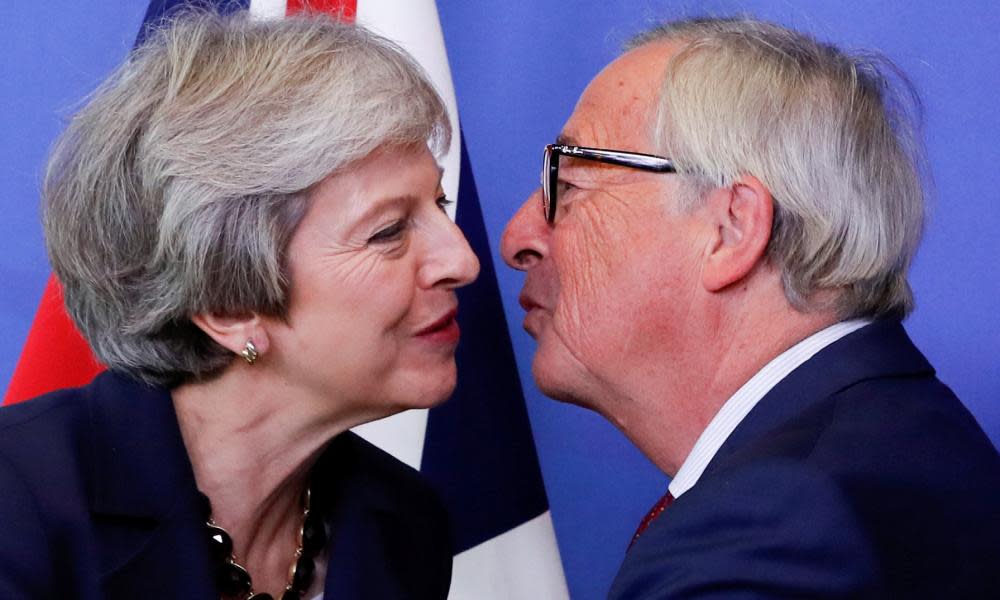Brussels Brexit talks: what are the sticking points between UK and EU?

The Brexit negotiations will be all but done in Brussels by Sunday lunchtime, according to a schedule published by the European council. The extraordinary Brexit summit called by Donald Tusk has allotted Theresa May an hour in mid-morning to chat with the 27 EU heads of state and government, before it is all wrapped up with a photo opportunity at midday.
The withdrawal agreement – covering citizens rights, the £39bnn divorce bill and the backstop solution to the Irish border problem – has been nailed down after all. And no one in Brussels has any inclination to reopen the text. However, given the past record of these negotiations, few in Brussels would rule out a dramatic twist.
Negotiations are continuing on the politically – but not legally – binding political declaration on the future relationship that will accompany what will become a withdrawal treaty.
May is seeing Jean-Claude Juncker in Brussels for tea on Wednesday afternoon to look over that document. Currently seven pages long, it is expected to end up close to 23 pages. Here are the outstanding issues that may yet present a bump in the road:
Gibraltar
Since the beginning, Spain has insisted that Gibraltar is not part of Great Britain and as such is not covered by any agreements made with the EU without Madrid’s consent. Following a series of commitments by the British government regarding tax evasion, tobacco smuggling and police cooperation, among other issues, it was agreed with Spain that Gibraltar would be included under the terms of the transition period, during which the UK and the Rock will stay in the single market and customs union but without representation in any of the EU’s decision-making institutions.
Spain has, however, taken umbrage at the lack of a clause in the withdrawal agreement or political declaration stipulating that Gibraltar will not be covered by a future trade deal unless Spain consents. The Spanish prime minister, Pedro Sánchez, who is vulnerable domestically, has said he will not agree to the Brexit deal on the table unless this is clarified. Spain will not be able to veto any deal, as unanimity is not required, but the EU will certainly want to back their member state against Britain, and assurances will have to be made.
The EU is demanding a reference in the political declaration and Downing Street is resisting.
Chequers
Theresa May is said by the EU’s chief negotiator, Michel Barnier, to be battling for a greater linkage to the Chequers proposals for trade in goods.
The UK had proposed a “common rulebook”. Brexiters hate the idea of giving up sovereign rights over large swathes of UK legislation but, if May is to win the support of backbench Labour MPs for her deal, she needs to show she is protecting British exporters from the red tape and delays that come from leaving the single market.
The prime minister wants reference to “frictionless” trade in the political declaration. There is little hope of such language, with Germany particularly vigilant against any reintroduction of Chequers through the back door.
A likely fudge will be a commitment to seeking “as frictionless trade as possible” through deep regulatory and customs cooperation.
Fishing
The fishing industry may be of less economic import to Europe than trade in mushrooms but its political clout is huge. Nine EU member states have an interest in keeping the future fishing arrangements with the UK, once it has left the common fisheries policy, as close as possible to those that exist today. France is insisting on quota-sharing commitments. It would be a huge blow for the British prime minister if such a clause was introduced into the political declaration. EU diplomats say a way out that might be satisfactory to Paris and others would be a side declaration at the summit in which the 27 member states lay out how they see the trade-off between European access to British waters and UK exporters’ access to the EU market.
Transition extension
The EU and and the British government have agreed a 21-month transition period during which the UK will stay in the single market and the customs union without any representation in any decision-making institutions.
In July 2020, six months before it is due to end, there will be a so-called “rendezvous” point where the two sides will assess whether they are on track for a trade deal to snap in on 1 January 2021 that can answerall the UK’s demands, respect the EU’s red lines and avoid a hard border on the island of Ireland. It is likely that there will need to be an extension.
As it stands, the withdrawal agreement says that a joint EU-UK committee would “before 1 July 2020, adopt a single decision extending the transition period up to [31 December 20XX]”.
The EU has suggested that there could be a maximum extension of two years. Certainly, Brussels wants any extension to be tied to its annual budget, and be counted in years rather than months. Each year could cost the UK taxpayer between £10bn and £15bn. The EU is waiting on the prime minister to make a fresh proposal.

 Yahoo News
Yahoo News 
